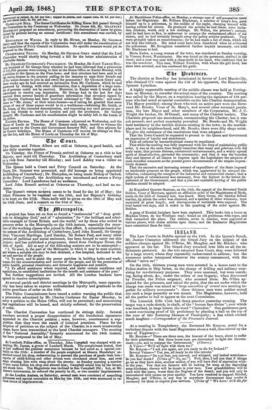Zbe, IfIttropolts.
A project has been set on foot to found a " testimonial " of " deep grati- tude to Almighty God," and of " admiration " for " the brilliant and admi- rable example to Great Britain and the world," set by those who united to preserve order in the Metropolis on the 10th instant, especially the mem- bers of the working classes who joined in that effort. A committee headed by the naives of the Archbishop of Crufterbury, Lord John Russell, Sir George Grey, Viscount Hardinge, Lord Stanley, Sir Robert Peel, and many other parsons of political and social eminence, has been formed to carry out this project; and has published a Programme, dated from Cockspur Street, the 10th of April. All or any of the following matters are to be attempted- " 1. To erect, in the part pf the Metropolis in which it may be most required, and where a suitable site may be best obtained, a free hospital, dedicated to the use and service of the people.
"2. To erect, and to assist the poorer parishes in building baths and wash- houses for the accommodation and service of the people, and for the promotion of public health, personal cleanliness, and domestic happiness and comfort.
"8. To afford assistance where required, and under certain conditions and regulations, to established institutions for the benefit and assistance of the poor." But further suggestions are invited. All the London bankers have agreed to receive subscriptions.
At several parish and district meetings in the Metropolis, some opportu- nity has been taken to express undintinishe,d loyalty and gratitude to the active guardians of order on the 10th.
The Police Commissioners have issued a notice warning the public that a procession advertised by Mr. Charles Cochrane for Easter Monday, to carry a petition to the Home Office, will not be permitted; and announcing that regulations will be issued, and strictly enforced, for the preservation of order.
The Chartist Convention has continued its sittings daily. Several members avowed a proper disapprobation of the fraudulent signatures appended to the Chartist petition ; some, however, countenance a sup- position that they were the result of inimical practices. Plans for the adoption of petitions on the subject of the Charter, in a more trustworthy shape, have been transmitted to the local Chartist managers. The meeting of the " National Assembly," formerly announced for the 24th instant, has been postponed to the 1st of May.
At Lambeth Police-office, on Thursday, John Campbell was charged with as- staking Mr. James, a grocer of Lambeth Marsh. The complainant stated, that he had suffered the greatest annoyance because be had acted as a special con- stable on the 10th: a number of the people employed at Messrs. Maudslays as- sembled round his shop, endeavouring to prevent the purchase of goods from him : reports of child-killing and other crimes were circulated about him, and even Wags abuaing him were sung about the streets: on Sunday morning a number linen came before his shop and abused him; Campbell seized him by the breast, sad shook him. The Magistrate was inclined to fine Campbell 201.; but, at Mr. James's intercession, he reduced the penalty to 54 or two months' imprisonment.
At the London Assizes, on Saturday, several men were convicted of assaulting Policemen and special constables on Monday the 10th, and were sentenced to va- rious terms of imprisonment.
At Marylebone Police-office, on Monday, a strange case of self-accusation came before the Magistrate. Mr. William Blackman, a solicitor of Gray's Inn, gave himself up to a policeman, in the middle of the night, charging himself with having robbed his sisters. He produced the articles he had taken, some imita- tion trinkets, worth only a few shillings. Mr. Wilton, the prisoner's partner, said he had been to Rye, to endeavour to arrange the embarrassed affairs of his sisters, and he had certainly brought away the paltry articles produced. They were probably taken as remembrances; for he had made a list of them, which did. not look like robbery. His mind must have been disordered when he addressed the policeman. Mr. Broughton considered further inquiry necessary, and held Mr. Blackman to bail.
Maria Radon, a young woman of the town, was murdered on Sunday morning, in Vincent Street, Westminster. She was found on the pavement, stabbed in the chest; and a man was near with a clasp-knife in his hand, who confessed that he was the murderer. This man, William Tomkina, with whom the girl lived, has since been arrested, and has confessed his guilt.


























 Previous page
Previous page